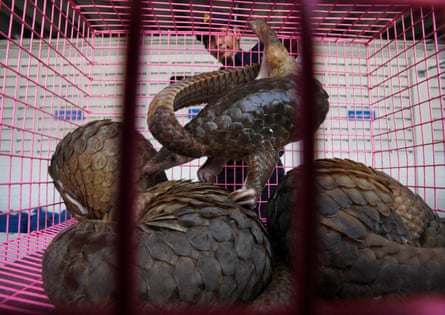For more than five years, wildlife conservationists in the US have been clamoring for the government to provide Endangered Species Act protections to pangolins, a group of imperiled ant-eating mammals that are widely, and often illicitly, trafficked for their scales and meat. The Trump administration, however, has refused to act and that refusal has suddenly taken on grave new implications.
Earlier this year, scientists in China identified pangolins, along with bats, as one of the possible animal hosts involved in the transmission of the deadly coronavirus from wildlife to humans.
Although there is still much uncertainty about the nature of the disease’s emergence, the unwillingness of the Trump administration, and the Obama administration before it, to provide legal protections to pangolins, and other species, has intensified scrutiny of America’s faltering role in international wildlife conservation efforts. Scientists and advocates say these are essential to preventing the kind of pandemic currently sweeping the globe.
Though no pangolins live in the US, an endangered species designation could make additional funding available to preserve the species, bolster efforts to crack down on illegal trade and send a powerful signal to the international community that the animals ought to be protected.
Like HIV, Sars and Ebola before it, the coronavirus that is wreaking devastation worldwide is a zoonotic disease, meaning that it spilled over from animals to humans. It is widely believed that the disease originated in bats and was transmitted to humans in a live animal market in Wuhan, China, where a variety of animals mixed amid a bustling human crowd.
Pangolins, which harbor coronaviruses similar to the one that causes Covid-19, may have played a role in the virus’s mutation and transmission to humans, though this theory remains in question.

What scientists know for certain is that the emergence of such zoonotic diseases occurs when humans disrupt healthy ecosystems, invade wildlife habitat, and trade and traffic in wild animals, whether bats, pangolins, birds, rodents or civets, a type of cat-like mammal that is often illegally trafficked and played a role in transmitting Sars to humans in the early 2000s. In this way, they expose themselves to deadly new pathogens, said Dr Jonathan Epstein, a vice-president at the EcoHealth Alliance, an organization dedicated to protecting wildlife and preventing zoonotic diseases.
“When ecosystems start to get disrupted, when we increase our contact with wildlife, that is when we see more opportunity for pathogens to jump from their wild animal reservoirs into domestic animals or humans,” Epstein said.
A 2017 study found that a “majority of emerging infectious diseases (and almost all recent pandemics) originate in animals, mostly wildlife”, as a result of interactions with people and livestock.
The US has historically been a global leader in the creation and the promotion of the kind of wildlife conservation efforts that may help prevent the emergence of new diseases. The US passed the Endangered Species Act in 1973, and it played a seminal role in the 1973 signing of the Cites treaty, which erected an international framework for the protection of imperiled animals and plants.
Under the Trump administration, however, the US has abandoned its leadership role in this arena, and critics say that the administration’s faltering commitment couldn’t have happened at a worse moment.
“It is not like any one thing would have stopped this pandemic, so you can’t make that generalization,” said Brett Hartl, the government affairs director at the Center for Biological Diversity. “But if the US were actually a leader in international wildlife conservation like it used to be back in the day and actually took its obligations seriously and was putting real pressure on trafficking and countries like China to stop decimation of pangolins and other species, who knows where we would be today.”
The Trump administration has presided over a broad rollback of wildlife conservation measures in recent years, weakening the Endangered Species Act enforcement and slowing the number of species added to the endangered list each year. And it has sought to slash the budget of the Fish and Wildlife Service, the country’s principal wildlife agency, which investigates wildlife traffickers and protects imperiled species at home and abroad.
The Trump administration also wants to cut more than $300m from programs run by the state department and USAid that promote habitat conservation and combat wildlife trafficking in Asia, Africa and elsewhere, according to a February report from the US Global Leadership Coalition. In light of threats such as Covid-19 and the climate crisis, the report asserts, the administration’s proposed cuts are “out of touch with America’s interests”.
Covid-19, scientists and advocates argue, has proven that this is not a time to reduce the US’s commitments to protecting and restoring the world’s ailing animal populations.
“As we have seen with this virus, every country is part of an interconnected world,” said Dr Barney Long, the senior director of species conservation at the group Global Wildlife Conservation.
“The wildlife trade is not a ‘China problem’,” he noted. “We have to act as one global community rather than individual countries or we are not going to break through these issues.”